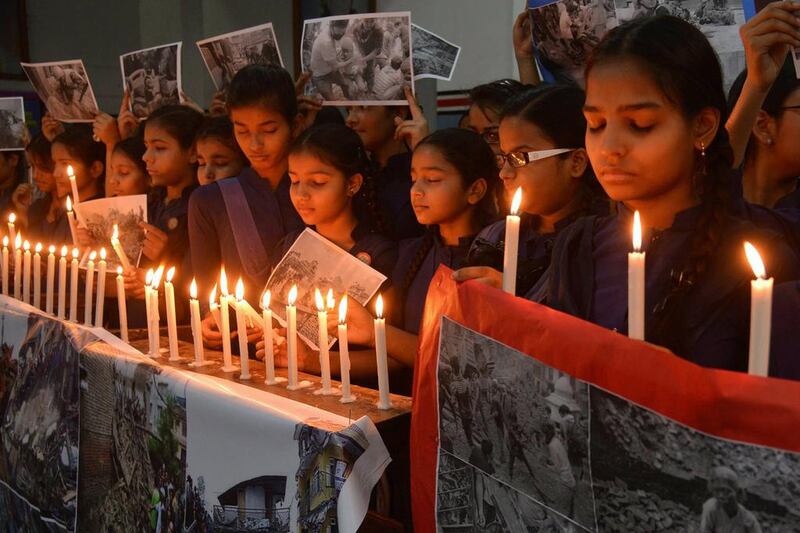NEW DELHI // When Meena Khatri felt the ground tremble under her feet on Saturday she thought it was one of the minor tremors that occasionally rumble beneath north India. It was only later that she learned of the 7.8 magnitude earthquake that struck her native Nepal, where her extended family lives.
“I started trying their phone numbers immediately,” said Ms Khatri, 34, who works as a domestic cleaner in south Delhi. “But I still haven’t been able to reach them. The phone lines are down, and their mobile phones aren’t reachable. I have no idea what has happened to them.”
Like thousands of other Nepali migrants in India, Ms Khatri was caught in the limbo of uncertainty. She didn’t know if she should attempt to travel back home to help out, or even if her family was alive.
Many of these migrants, like Ms Khatri, are not well off, sending a large part of their savings home every month. They cannot afford to fly to Nepal on the few flights that have begun to operate. A journey by road would take Ms Khatri the better part of three days.
Ms Khatri’s mother is visiting her in New Delhi, and her brother moved to Japan to look for work just a month ago. But her father, her brother’s wife and his nephew still live in Chabahil, a suburb of Kathmandu.
“From the news, I know that my locality in Kathmandu is largely all right,” Ms Khatri said. “But it was a Saturday afternoon when the earthquake hit, so they may have gone out somewhere and been injured. They may have gone to a temple, and so many of the temples in Kathmandu have collapsed.”
Ms Khatri managed to contact a cousin who lives in a village far from Kathmandu. “When I spoke to him on Sunday, he was all right,” she said. “He said he was going to leave that day to try and reach Kathmandu, whichever way he could, to check up on my family.”
“But the trip will take him at least 30 hours, and maybe more,” she said. “My mother is weeping all the time because she doesn’t have any news of my father.”
The number of Nepali migrants in India is not clear — estimates in the media, government statistics and academic studies range from 700,000 to 2.5 million. The land border between India and Nepal is open, and travel between the two countries is visa-free, enabling Nepalis to easily move to India to live and work.
Amish Mulmi, an editor at the publishing firm Hachette, learnt on Saturday, in a rare phone call that went through the disrupted telecommunications networks, that his family in Kathmandu was “okay, but very shaken”.
“But the news is depressing. My aunt’s family is running out of supplies, and they’re trying to work out what to do for water,” Mr Mulmi said. “We’re trying to get some chlorine tablets across to them, so that they can purify the water they do find.”
He is also trying to decide whether he should stay in India, routing help to his family and other affected Nepalis, or return home.
“Right now, I guess I’ll stay. The roads are damaged, and you can’t access the villages outside Kathmandu at the moment anyway,” he said. “Maybe I’ll go next week, once things are better.”
Nepal’s embassy in New Delhi opened a hotline for citizens to get information, but Shiv Kumar Khatri, 31, a driver for a family in the capital, said he had not heard of it because it had not been publicised enough.
“I tried my family again and again, after the earthquake,” Mr Khatri said. On Sunday, a phone call to his brother, in a village just outside Kathmandu, went through. “His house is fine, but it has cracks in it, so some damage has happened.”
His uncle in Kathmandu, though, was unreachable. “My brother may go to the city to see if he is all right,” Mr Khatri said.
Another Nepali migrant, Vishnu Hanal, a 36-year-old wholesaler of toys, fretted about his parents and his brother in a small village roughly 150 kilometres from Kathmandu. He knows they are unharmed because a neighbour in the village sent him a text message.
“But there is no electricity, and the house is damaged, so it’s dangerous to stay indoors,” Mr Hanal said. “So they’re staying just outside the house, but now it’s raining heavily, and that’s a bad situation.”
“I want to go home, but the roads are jammed,” he added. On Tuesday, he will attend a meeting of the Nepali Ekta Samaj, a community organisation for Nepalis in New Delhi, and hopes to get some ideas from his compatriots in the city.
Throughout Monday, meanwhile, Ms Khatri tried her father’s phone number, having heard that mobile networks were slowly getting back online.
“Finally, he called me in the evening,” Ms Khatri said joyously. “It’s such a relief. They’re staying in a relative’s cowshed, just to be safe, because people are saying that smaller earthquakes may still happen.”
“But they’re all well, and nobody is injured. Now, finally, I’ll get a good night’s sleep.”
ssubramanian@thenational.ae





